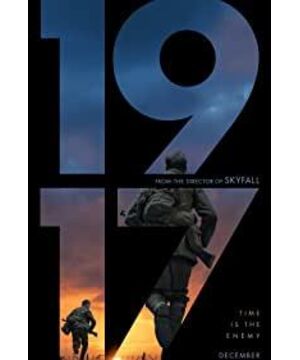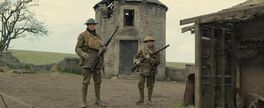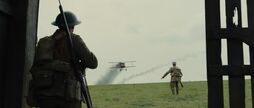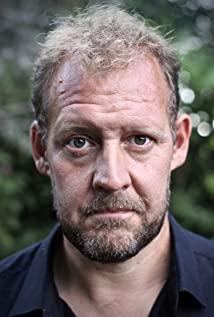Perhaps because it did not win the best picture at the Academy Awards, the movie "1917" is not as popular as the award-winning "Parasite" in China, but a good movie should not be buried because it did not win the best picture. , especially anti-war films.
Born in a time of peace, most people cannot understand war and feel the sting of war, and the torrent of steel, firearms and artillery are more likely to arouse the blood of young people. After two world wars, 67 million people died, the cost of war is unparalleled, and now if we can reflect on war in a time of peace, it may be the best consolation for those who died in the maintenance of peace.
1917 was the late period of the First World War, and the movie "1917" tells the story under this period of history. At the beginning of the film, two 16-year-old soldiers were ordered to go to the frontline troops to deliver the order to stop the attack. So following the perspective of these two soldiers, we saw the tragedy of the war along the way.
The battlefield / corpses are everywhere, there is no winner in the war
The action of alternate cover in the trenches, the accurate judgment of the battle situation in the tunnel, the two 16-year-old soldiers have battlefield survival experience that is not suitable for their age, and they have become veterans in advance, until the protagonist Schofield complained to Blake. Say, why do you call me for such a dangerous thing, the audience will remember their age, they are still children, and their hearts will be so immature.
The 16-year-old has been in the battlefield for a long time and has become a veteran, but where are the real veterans in their 20s? The answers have been found along the way. Those corpses that can be seen everywhere along the way and uncollected are just young lives. Perhaps the war will only stop if the young people are killed and those who can hold guns are finished.
Stumps and broken arms, rotting corpses, soldiers hanging on barbed wire, mud pits hit by large and small shells, and a barren battlefield, in stark contrast to the sturdy grass behind. If there was no war, wouldn't Blake rest like at the beginning? The grass is just as beautiful.
Home/The place that your heart desires
The first high-level "punctuation" in the movie appeared in the dialogue between the two about the medal. Blake said that if he can get the medal, he must take it home, while Schofield said that the medal is meaningless, and he would rather exchange it for wine. , and said that he hated going home, because when he thought that he couldn't stay home for a long time, it might be a goodbye as soon as he left, and he began to hate going home. Does Schofield really hate going home? It's like a seed was planted here.
Blake died not far from a felled cherry blossom garden, and in this small garden, Blake told the story of once and his brother in his own cherry blossom garden. The cherry tree was cut down by the German army, and Blake also died in its In the distance, so close to the beautiful, but unable to touch, Blake will never go home again, nor will he see the brother he wants to save, the seeds of "home" begin to germinate.
The seeds of returning home are growing in people's hearts. When Schofield finally arrived at the front line after going through thousands of dangers, the movie used a song to reflect their longing for home, and at the same time swept through a group of soldiers, who were so young, but Their lives may come to an end. If you want to go home but have to charge, maybe this is the helplessness of every soldier who goes to the battlefield.
There is only one way to end the war/Fight to the end
"1917" would not have been a great film without a passage from Colonel Mackenzie at the end, which stayed within the framework of traditional anti-war films, and this passage shows the powerlessness of ordinary soldiers, whether it be Colonel Mackenzie's aggressive attack, or Schofield's desperate rush to the front to stop the attack, was a drop in the bucket for the war.
The stop attack sent by Schofield at this time may not save their lives. If you don't fight today, it doesn't mean you won't fight next week. Ordinary soldiers still have to obey orders and risk their lives. The man who sang homesick in the jungle Qu's soldier, will he finally be able to go home, no one knows, and no one can guarantee it.
The scene of the movie leaning against a tree in Schofield is over. It is quiet and peaceful, and everything around is so warm. The director used warm tones to describe this scene, making the picture as beautiful as possible, so that the audience can forget the cruelty at this moment. War, but Blake, who was lying next to him at the beginning of the movie, is no longer there. The war is still not over, and it may break out at any time.
The whole movie does not have a grand war scene like "Blood Battle Hacksaw Ridge", nor does it have too much blood to reflect the cruelty of the war. Instead, it uses restraint and calm methods to restore a real battlefield with small ideas.
In the cruel battlefield, the director also mixed romantic creations, such as the cherry blossom garden, such as the burning church, which is a bit like the oil painting texture of the Hound and Moshan in "Game of Thrones", and the falling petals of Schofield when he was drifting in the river. , especially the beginning and the end echo the quiet, warm grass, everything is so beautiful, if there is no war.
If there is no war!
View more about 1917 reviews











